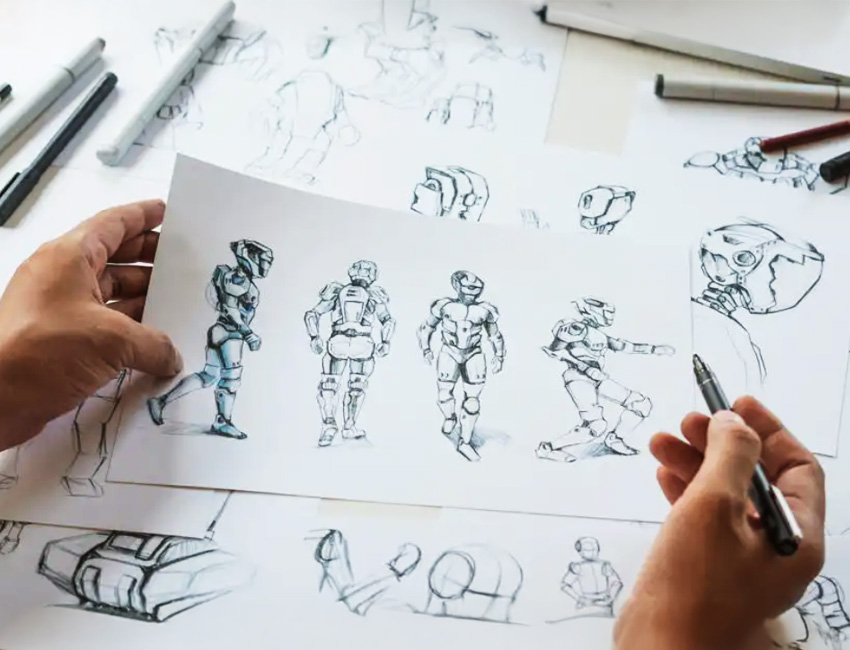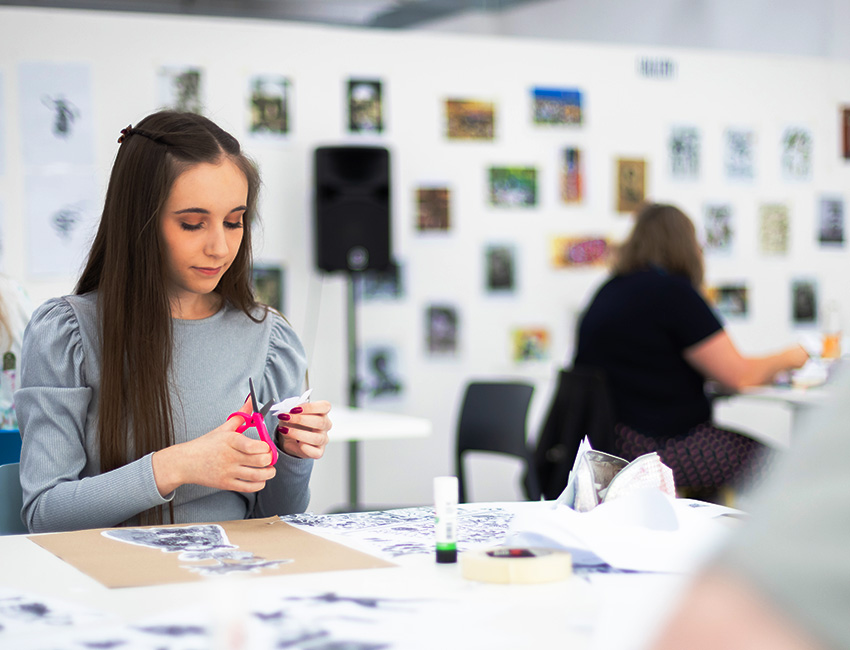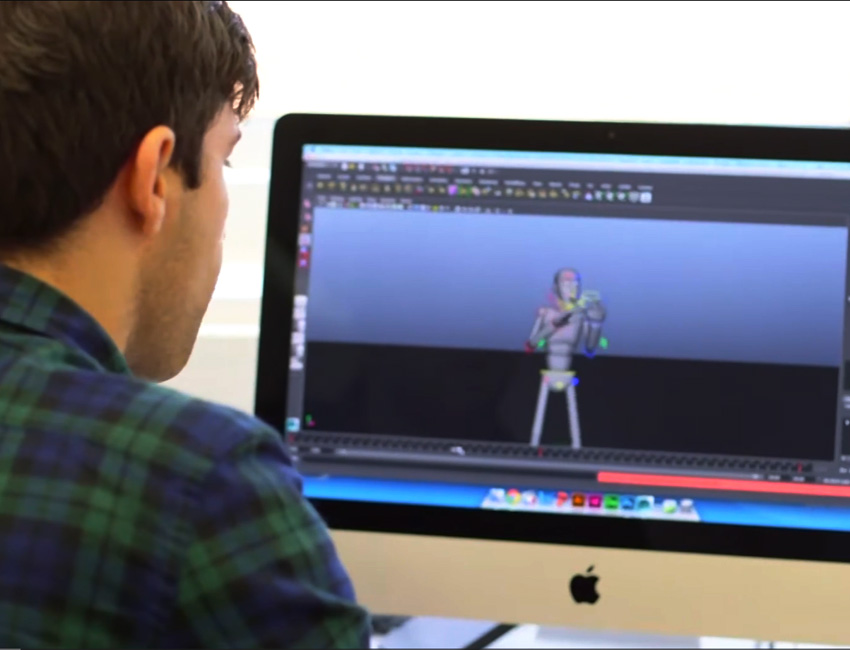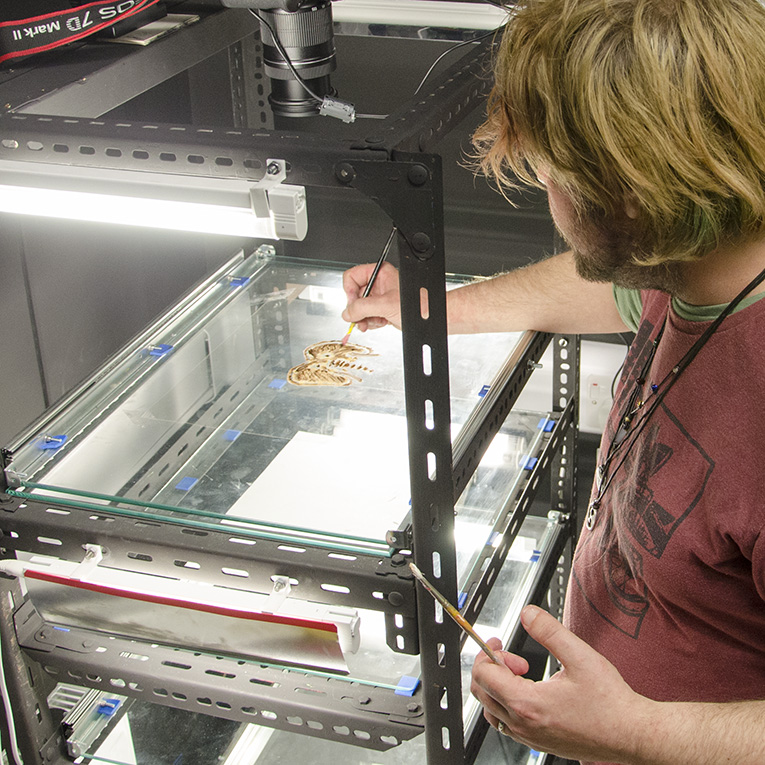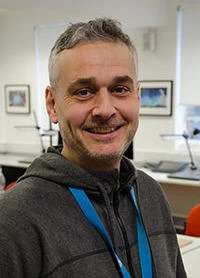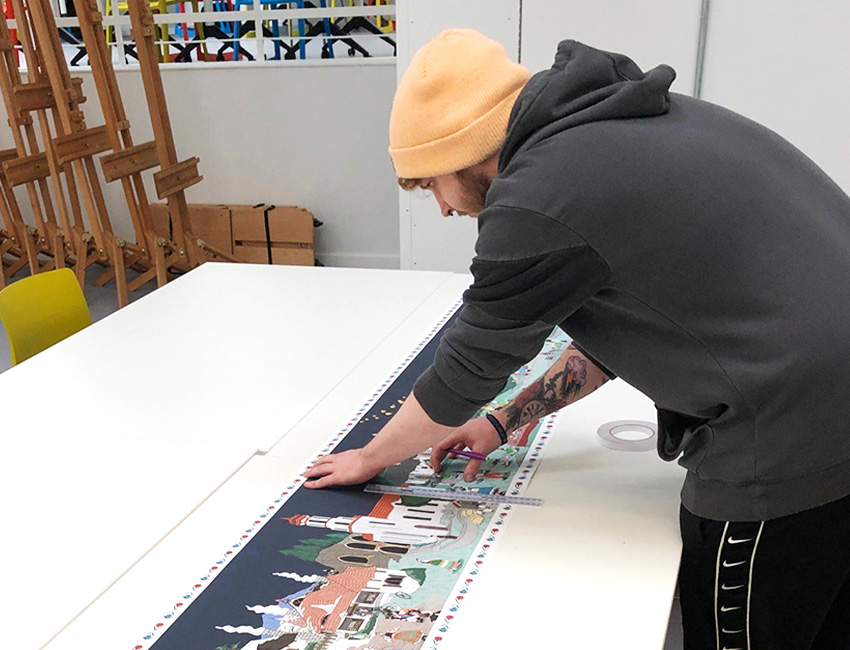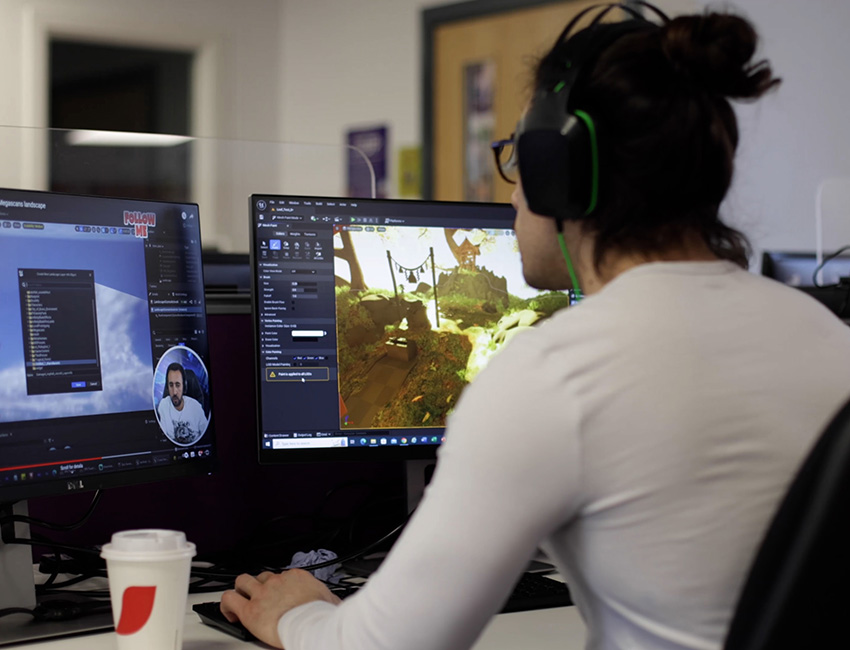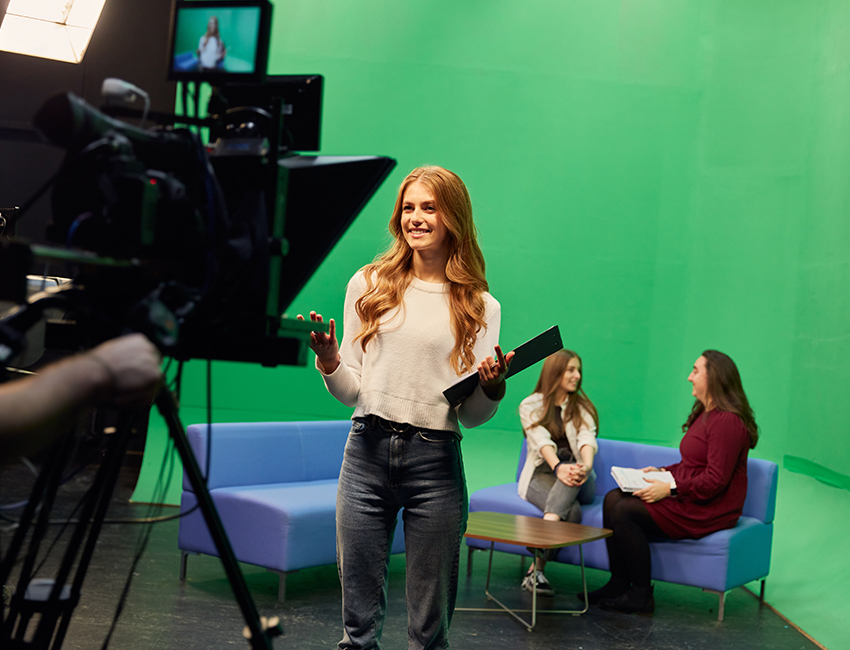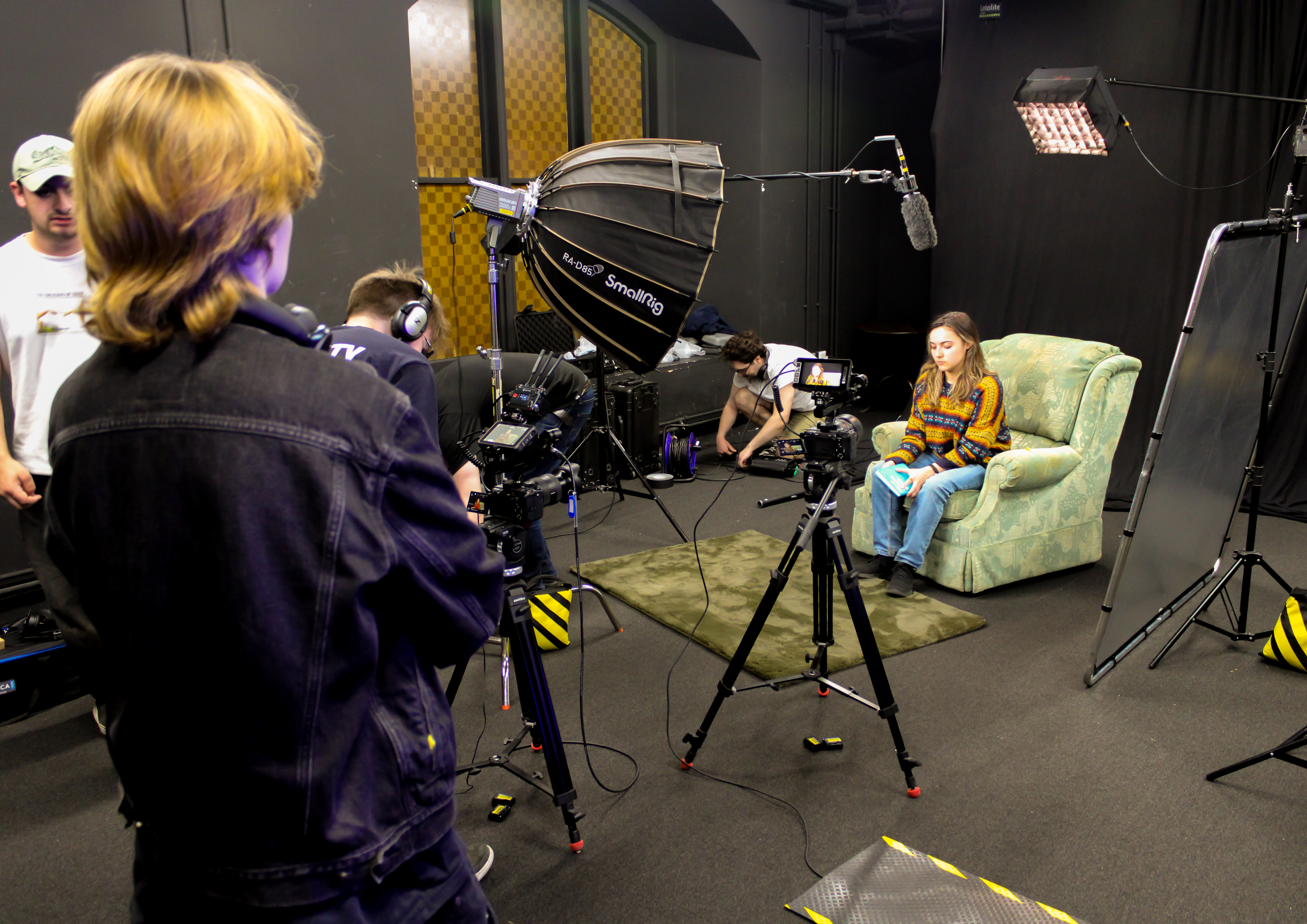At Worcester, you’ll gain hands-on experience in production, editing, and animation, whilst developing skills in pitching, writing for various media, and communicating your ideas. With flexible module choices, you can tailor your learning and graduate equipped to pursue your chosen creative path.
for art and design graduate prospects
Students feel able to contact teaching staff when they need
University of the Year finalist
Recognised for our graduate success, we’re shortlisted for University of the Year in the Times Higher Education Awards 2025.
Overview
Studying Animation provides the opportunity to learn about the theory, history and the fundamental skills needed to practice various animation styles, which you can combine with your own practical work as you develop your skillset. Get involved with hands-on projects in our film and animation studios and familiarise yourself with industry-standard software, such as Maya, ZBrush, Marvellous Design, Adobe Suite and Toon Boom, as you create storyboards and develop your own characters.
We have a team of on-site technicians who will be able to assist you in using our industry standard software, film and sound equipment outside of lectures, helping you build up experience in using and adapting to various forms of tech, a skill highly sought after in various industries. You’ll also be allocated your own Personal Academic Tutor who can help you support you with the academic side of the course and provide guidance in how you can get the most out of the course and graduate with confidence in your abilities as an animator.
Our modules are designed to provide you with skills and experience in creating 2D, 3D, traditional and digital animation. Plus, our variety of optional modules, particularly the Animation Specialist Development module, will allow you to develop a specialism in a particular area, whether that's a specific animation style or focusing in on character or world design.
Meet industry professionals and benefit from insider knowledge through our links with BAFTA-winning regional animation studios such as Dice Productions, Yaminations and Second Home Studios.
Showcase your work to industry professionals at our annual Arts Degree Show. This, plus opportunities to attend conferences and events, will give you the chance to promote who you are as a creator, and build your own network of industry contacts.
By the time you graduate, you’ll have evidence of industry-standard work, networked with students from our other film and media courses, and met with industry professionals.
Course content
Personalise your learning experience by choosing optional modules that reflect your interests and career goals. These sit alongside a core set of mandatory modules, designed to give you the academic grounding, theoretical understanding, and professional skills needed to succeed after graduation.
Animation is offered as part of a joint honours degree, so the below modules offer an overview of the Animation focused modules we offer. These will be combined with the modules offered by your second subject.
We regularly review our courses to reflect the latest research and developments in the subject area, as well as feedback from students, employers and the wider sector. As a result, modules may change to ensure the course remains current and relevant.
Optional modules will run if enough students choose to study them. It is not guaranteed that all modules will be offered every year.
Careers
Our graduates have gone on to be employed at Aardman, Off The Fence, Frames of Mind, ILM, Local TV Leeds and Rockstar Games.
There are various roles within animation you could progress onto, such as:
- Concept art
- Character design
- Environmental art
- Compositing
- Illustrating
- Visual effects
The combination of creative and analytical thinking, plus the practical skills of using various pieces of technical equipment and software, provides you with highly sought-after skills in a range of fields, such as:
- Advertising and Marketing
- Web design
- Game development
- Multimedia creation
- Designing for exhibitions, events or theatre
- Producing for film, television, music videos or theatre
Postgraduate study
You could progress from this undergraduate degree and study one of our postgraduate courses, such as Film MRes, Creative Media MA, Cultural Studies MA, Culture, Media and Film MPhil and PhD or our Media and Culture MRes.
The course at Worcester expanded my understanding of animation, helped me realise my potential, gave me creativity, purpose and focus, and helped me define my career.
Course highlights
Teaching and assessment
Throughout the course, you’ll be working on industry briefs aimed to give you experience in various styles and processes within animation, whilst being supported to find your own passion. You'll learn through a mixture of independent study, teaching, and hands-on learning.
Teaching and assessment contents
You'll learn through a combination of interactive workshops, lectures, and Studio practices so you can apply theory to practice and have the opportunity to get involved with active discussion and share your opinions and observations on what you've learnt.
Structured individual tutorial support will provide you with feedback on the set tasks, helping you find your strengths and have support on further developing your skills and knowledge in preparation for demonstrating your skillset in the formal assignments for each module.
You'll use industry-standard design software and have access to computer suits as well as our animation studios throughout the course. In addition to this specialist hardware such as lightboxes, Wacom tablets and cameras are available to you.
Meet the team
You will be taught by a teaching team whose expertise and knowledge are closely matched to the content of the modules on the course. The team includes senior academics, professional practitioners with industry experience, demonstrators and technical officers.
Entry requirements
UCAS tariff points required: 104
| Qualification | Grade |
|---|---|
| A-level | BCC |
| BTEC National Extended Diploma | DMM |
| T-level | M |
We do accept Access to HE Diplomas and other qualifications which may not exactly match the combinations above. Work out your estimated points with the UCAS tariff calculator.
Any questions?
If you have any questions about entry requirements, please call our Admissions Office on 01905 855111 or email admissions@worc.ac.uk.
Fees
Fees contents
UK and EU students
In 2026/27 the standard fee for full-time home and EU undergraduate students on BA/BSc/LLB degrees and FdA/FdSc degrees is £9,790 per year.
Tuition fees are reviewed annually and may increase each year for both new and continuing students.
For more details on course fees, please visit our course fees page.
International students
In 2026/27 the standard tuition fee for full-time international students enrolling on BA/BSc/LLB degrees and FdA/FdSc degrees is £17,200 per year.
Tuition fees are reviewed annually and may increase each year for both new and continuing students.
For more details on course fees, please visit our course fees page.
How to apply
How to apply contents
Applying through UCAS
UCAS is the central organisation through which applications are processed for full-time undergraduate courses in the UK.
Read our how to apply pages for more information on the application process, or if you’d like to apply for part-time study.
Our Animation course is available as a joint honors, meaning you can combine it with another subject of your course.
Popular combinations include:
Contact
If you have any questions, please get in touch. We're here to help you every step of the way.
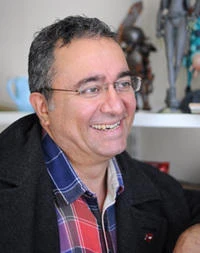
Admissions Office
admissions@worc.ac.uk01905 855111More to explore
Open Days
Visiting us is the best way to get a feel for student life at the University of Worcester.

The City of Worcester
Worcester is a welcoming university city with great transport links and plenty of student parking.

Accommodation
Benefit from our accommodation guarantee. We have rooms on campus to suit every budget including en-suite options.

